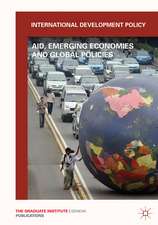International Assistance to Police Reform: Managing Peacebuilding
Autor steffen eckharden Limba Engleză Hardback – 28 iun 2016
Building on field research and over one hundred expert interviews, International assistance to police reform: Managing Peacebuilding systematically compares such operations in two different contexts—Kosovo and Afghanistan—by focusing specifically on international assistance for local police reform since 1999.
Four comprehensive case studies examine operations in Kosovo and Afghanistan before and after the European Union took over police reform responsibilities: in Kosovo from the Organization for Security and Co-operation in Europe (OSCE) and in Afghanistan from the German government. Speaking to scholars and practitioners in domestic and international organizations, the book drills in the complex relation between headquarter diplomats and field level conflict experts. Its findings combine to a set of recommendations for policy-makers to better align their operations to the contentious politics of conflict management and peacebuilding.
| Toate formatele și edițiile | Preț | Express |
|---|---|---|
| Paperback (1) | 383.71 lei 6-8 săpt. | |
| Palgrave Macmillan UK – 9 dec 2018 | 383.71 lei 6-8 săpt. | |
| Hardback (1) | 389.70 lei 6-8 săpt. | |
| Palgrave Macmillan UK – 28 iun 2016 | 389.70 lei 6-8 săpt. |
Preț: 389.70 lei
Nou
Puncte Express: 585
Preț estimativ în valută:
74.58€ • 77.42$ • 62.19£
74.58€ • 77.42$ • 62.19£
Carte tipărită la comandă
Livrare economică 22 martie-05 aprilie
Preluare comenzi: 021 569.72.76
Specificații
ISBN-13: 9781137595119
ISBN-10: 1137595116
Pagini: 249
Ilustrații: XV, 242 p. 6 illus.
Dimensiuni: 148 x 210 x 20 mm
Greutate: 0.45 kg
Ediția:1st ed. 2016
Editura: Palgrave Macmillan UK
Colecția Palgrave Macmillan
Locul publicării:London, United Kingdom
ISBN-10: 1137595116
Pagini: 249
Ilustrații: XV, 242 p. 6 illus.
Dimensiuni: 148 x 210 x 20 mm
Greutate: 0.45 kg
Ediția:1st ed. 2016
Editura: Palgrave Macmillan UK
Colecția Palgrave Macmillan
Locul publicării:London, United Kingdom
Cuprins
List of tables and figures.- Acknowledgements.- List of Abbreviations.- Chapter 1. Introduction.- Chapter 2. From institutional designs to peacebuilding outcomes.- Chapter 3. The OSCE’s contribution to police reform in Kosovo.- Chapter 4. The EU’s contribution to police reform in Kosovo.- Chapter 5. The German contribution to police reform in Afghanistan.- Chapter 6. The EU’s contribution to police reform in Afghanistan.- Chapter 7. Comparison: Managing institutions to raise peacebuilding odds.- Chapter 8. Conclusion.- Notes.- Appendix 1.- List of References.
Notă biografică
Steffen Eckhard is senior researcher at the University of Munich and a non-resident research fellow at the Global Public Policy Institute (GPPi) in Berlin. His research focuses on the conflicts and reconciliation of different rationales in politics and administration—both in domestic and international public organizations—with an emphasis on global peace and security governance.
Textul de pe ultima copertă
This book compares police reform operations in Kosovo and Afghanistan, addressing the internal machinery that makes peace operations work—or not. Recognizing that the chances for effective peacebuilding vary widely across contexts, this book investigates the impact of one of the few variables that peacebuilders do control: the management and design of peace operations.
Building on field research and over one hundred expert interviews, International assistance to police reform: Managing Peacebuilding systematically compares such operations in two different contexts—Kosovo and Afghanistan—by focusing specifically on international assistance for local police reform since 1999.
Four comprehensive case studies examine operations in Kosovo and Afghanistan before and after the European Union took over police reform responsibilities: in Kosovo from the Organization for Security and Co-operation in Europe (OSCE) and in Afghanistan from the German government.Speaking to scholars and practitioners in domestic and international organizations, the book drills in the complex relation between headquarter diplomats and field level conflict experts. Its findings combine to a set of recommendations for policy-makers to better align their operations to the contentious politics of conflict management and peacebuilding.
Building on field research and over one hundred expert interviews, International assistance to police reform: Managing Peacebuilding systematically compares such operations in two different contexts—Kosovo and Afghanistan—by focusing specifically on international assistance for local police reform since 1999.
Four comprehensive case studies examine operations in Kosovo and Afghanistan before and after the European Union took over police reform responsibilities: in Kosovo from the Organization for Security and Co-operation in Europe (OSCE) and in Afghanistan from the German government.Speaking to scholars and practitioners in domestic and international organizations, the book drills in the complex relation between headquarter diplomats and field level conflict experts. Its findings combine to a set of recommendations for policy-makers to better align their operations to the contentious politics of conflict management and peacebuilding.

















